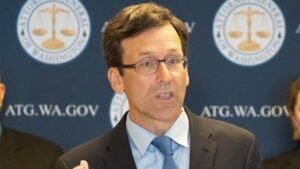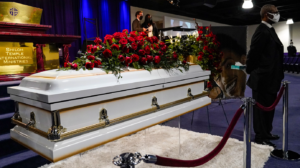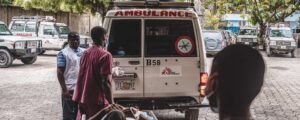A decision that sets back the Environmental Protection Agency will have a domino effect on Black people nationwide.
As we near Independence Day, the freedom to breathe clean air is even more under siege after the Thursday (June 30) 6-3 Supreme Court ruling on West Virginia v. EPA that can place severe limitations on the EPA’s government authority to regulate greenhouse gas emissions. By removing these government regulations of pollutants, Black communities will continue turning into what Pro Publica identified as “sacrifice zones” in that state and across the country.
Black families nationwide are set to bear the burdens of this ruling, burdens we already disproportionately carry with 68 percent of Black people living within a 30-mile radius of a coal-fired power plant, says Green America, in a report. Three of every five Black people live near toxic waste sites, according to National Conference for Community and Justice data. They are also 34 percent more likely to reside in areas with higher cases and likelihood of childhood asthma, EPA figures show.
Additionally, the risk of older Black folks dying from air pollution is triple in comparison to White people. Black people pollute the least, but our communities suffer the most from air pollution that contributes to multiple types of cancer, including lung and breast cancer.
Climate change most impacts Black people because it is rooted in racism, severing generational family bonds and widening the racial wealth gap. As climate change makes weather extremes worse, Black communities are twice as likely to be denied for FEMA support after a weather disaster, studies show. Furthermore, descendants of Black property owners who inherit heirs’ property cannot receive homeowners assistance and often lose their homes altogether after major hurricanes, tornadoes, or flooding.
The Supreme Court ruling will have a domino effect that reduces water and food quality. And as pollution exacerbates the climate crisis that leads to more catastrophic weather events, it will change Black history and narratives that share the truth around Black American identities.
In Louisiana, there is a palpable intersection of climate change and pollution. For me, a Black woman, protecting Black History will always include fighting in the ongoing war against climate impacts that threaten historical sites like the Whitney Plantation in Edgard, La., a site that was under threat of closure last year due to Hurricane Ida.
Now reopened, the museum tells a truth beyond the romanticism of southern life during the antebellum period. The testimonies of over 2,300 enslaved people who were enslaved as children guided the narrative and dedications there, serving as a powerful reminder of how the past disadvantaged us in ways that make equity a modern-day necessity.
RELATED: Supreme Court Reverses History, Overturns Roe v. Wade in 6-3 Decision
RELATED: Michigan Activist Fights to Keep Asphalt Plant From Opening In City Already Beleaguered With Environmental Issues
Roughly an hour from the Whitney Plantation sits New Orleans, a city that often bears the brunt of extreme weather events caused by climate change, the most well-known event being Hurricane Katrina in 2005. The record number of displaced people and casualties, more than half of which were Black lives, made Katrina one of the worst storms in U.S. history.
Severe flooding from Katrina affected everyone in New Orleans regardless of race, but the worst flooding happened in predominantly Black neighborhoods and displaced 96,000 Black people. Ten years later, 80 percent of White residents in New Orleans felt good about the city’s recovery. Black residents disagreed, with roughly one of every three Black survivors who lost their houses never returning to the city they once called home.
Louisiana is also famous for climate disasters that displaced communities in Isle de Jean Charles, (most were members of the Biloxi-Chitimacha-Choctaw Tribe) and the fatal pollution in Black communities like ‘Cancer Alley.’ And, unfortunately, there are cancer alleys and climate displacement in communities of color across the country and the globe.
President Biden has promised to fight environmental racism since he was elected, and his team recently expressed their concern about the climate emergency (and their efforts to act despite limitations) but they can’t do it alone.
More Americans should educate themselves on racist climate disparities and approach elected officials for solutions – solutions that dismantle redlining, which pushes Black residents into areas more vulnerable to climate disasters. We can also support and advocate for green infrastructure initiatives from the local up to the national level. Green infrastructure creates economic opportunities while working with nature to lower pollution and could better shield majority-Black communities from extreme temperatures and flooding.
On a national scale, The Build Back Better Act would lower pollution by transitioning us to a clean energy economy in a way that is just and equitable; it would support job placement, protect biodiversity and invest in lower-income communities on the frontlines of the climate crisis.
Currently an estimated 84 million global citizens, many of whom are people of color, are experiencing displacement with climate change at the helm of contributing factors. According to the Institute for Economics and Peace, the number of people displaced by climate change could hit 1.2 billion by 2050.
Advocating for policies like the Climate Displaced Persons Act, a bill that focuses on climate resilience and immigration, could be part of the solution. It would offer legal protection authorizing immigration into the U.S. and provide resettlement assistance to people who lost their livelihoods due to environmental changes. Strategies would also be implemented to prevent further losses in the future.
So, the Supreme Court’s ruling on West Virginia v. EPA is another historic ruling close to Independence Day, but a lesser known holiday follows – Tell the Truth Day. It’s time to tell the truth about how climate change and pollution has historically been unregulated in communities where residents are primarily Black, Indigenous, and People of Color. It is an injustice that erases Black lives and contributes to the erasure of Black history in a country where the freedom to breathe and exist in a safe environment is determined by race and inherited privilege.
Princella Talley is based in Louisiana and a Fellow at Large at The OpEd Project. She is also a Public Voices Fellow of the OpEd Project and the Yale Program on Climate Change Communication.




